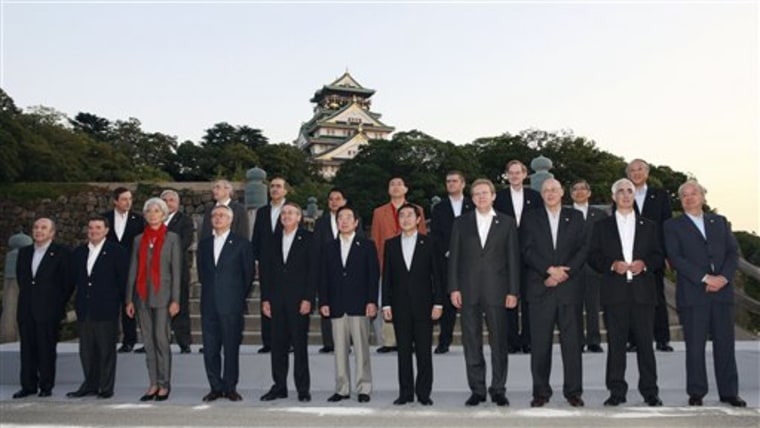Finance ministers from the world's top industrialized nations wrapped up talks Saturday after vowing to grapple with the economic risks of soaring oil and food prices and assist developing countries in the fight against global warming.
While not on the official schedule, the U.S. dollar also drew attention at the two-day meeting as the currency has rebounded from recent lows against the euro.
The finance ministers from the Group of Eight nations — Britain, Canada, France, Germany, Italy, Japan, Russia and the U.S. — mapped out an agenda for a summit of their leaders next month in northern Japan.
G-8 officials, both this weekend and in July, are facing a host of issues that threaten to destabilize the global economy.
Oil spiked to nearly $140 a barrel last week, and several Asian countries, including India, Indonesia and Malaysia, have slashed fuel subsidies, raising prices for millions of consumers.
Food crisis fears
The world is also facing a potential food emergency as prices of corn, wheat, rice, soybeans and other agriculture products rise. The price hikes have set off riots and protests from Africa to Asia and elevated fears of a global food crisis that could cause millions of people to suffer malnutrition.
It was unclear whether the meetings produced any concrete measures to address the issues.
Oil prices pulled back overnight, with benchmark light sweet crude for July delivery falling $1.88 to settle at $134.86 on the New York Mercantile Exchange, after OPEC questioned whether crude can remain so high.
Soaring energy costs pushed inflation up in May at the fastest pace in six months, according to data released Friday by the U.S. Labor Department. Food prices, which had taken the biggest one-month leap in 18 years in April, rose by a more moderate 0.3 percent in May, but were still on the rise.
As G-8 host, Japanese Finance Minister Fukushiro Nukaga pledged to work closely with the U.S., Japan's most important ally, to tackle the looming dangers.
"We need to coordinate our actions closely because of the many risk factors," he told reporters after meeting with U.S. Treasury Secretary Henry Paulson.
Nukaga also expressed worries about the U.S. economy, gripped by a credit crunch triggered by a surge in defaults on mortgage loans to borrowers with risky credit histories. That has led to multibillion-dollar losses at financial companies and global market turmoil.
"We must remain vigilant on this," he said.
Nukaga, however, declined to comment on his talks on currency rates with Paulson.
Dollar's influence
The weak U.S. currency is considered a key culprit in the surge in oil prices because some traders invest in oil as a hedge against inflation and a slumping dollar. It also hurts major exporters like Japan by eroding their repatriated earnings.
The dollar has strengthened in recent days after Paulson warned earlier this week that he isn't ruling out intervening in currency markets to stabilize the currency. U.S. Federal Reserve Chairman Ben Bernanke also helped lift the dollar by suggesting the Fed is prepared to raise interest rates to fight inflation.
French Finance Minister Christine Lagarde said Friday that she found the dollar's recent rise "satisfying." She added that currencies, inflation and commodity prices are closely linked.
With central bank governors absent from this weekend's meetings, foreign exchange is unlikely to be included in any official statements by the G-8 finance ministers. But market observers are on close watch for any dollar-supportive statements by officials.
In midday trading Friday in New York, the dollar was trading just below 108 yen and the euro had fallen below $1.54.
Nukaga and Paulson, along with British Chancellor Alistair Darling and World Bank Group President Robert Zoellick, appeared together later in the day to tout funds designed to help developing nations fight global warming — another major issue for the G-8.
"As you look ahead, the biggest user of energy, in terms of the increase, is going to be the developing world," Paulson told reporters.
Paulson said he was optimistic that one piece of the effort — a $10-billion clean technology fund — would attract broad-based support from both developed and developing countries.
The Bush administration has asked Congress for $2 billion for the fund, which would help developing countries such as China and India pay for the costs of clean energy technologies. Paulson said the U.S. would also host a pledge event before the fund's committee meets later this year.
Britain has offered about $1.56 billion, and Japanese Prime Minister Yasuo Fukuda announced this week a pledge of up to $1.2 billion for the effort.
Zoellick said the developing world is being hit by impact of climate change, including droughts, floods, poverty and hunger.
"These funds offer an opportunity to take action on change now," he said. "The Climate Investment Funds are a concrete step forward toward meeting the challenge of global climate change."
